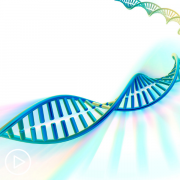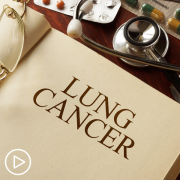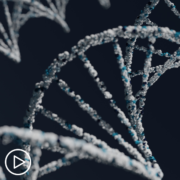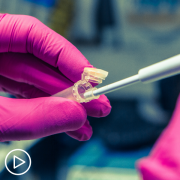What Do Metastatic Breast Cancer Patients Need to Know About Genetic Testing?
What Do Metastatic Breast Cancer Patients Need to Know About Genetic Testing? from Patient Empowerment Network on Vimeo.
What do metastatic breast cancer patients need to learn about genetic testing? Expert Dr. Sarah Sammons explains the difference between germline testing versus somatic testing and defines key terms, including biomarker testing and genetic mutations.
Dr. Sarah Sammons is an oncologist at Duke Cancer Institute and Assistant Professor of Medicine at Duke University School of Medicine. Learn more about Dr. Sammons here.
See More From INSIST! Metastatic Breast Cancer
Related Resources:
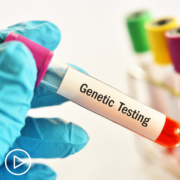
|

Essential Testing Following a Metastatic Breast Cancer Diagnosis |
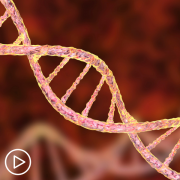
How Do Genetic Mutations Impact Breast Cancer Risk, Prognosis and Treatment? |
Transcript:
Katherine:
Many patients are confused by genetic testing. Let’s look at the difference between germline and somatic testing.
Dr. Sammons:
Yes, that’s a really good question and one that comes up in the clinic quite frequently. When I tell a patient that I want to get some sort of genetic testing, they often are confused, and say, “Well, I’ve already had genetic testing, maybe when I was first diagnosed with early-stage breast cancer.” And so then, I do often times need to explain what the difference between germline and somatic genetic testing is.
So, germline testing is testing that’s done on cells in your body that actually don’t have cancer. And the purpose of germline testing, which we often do in early-state breast cancer or in metastatic breast cancer, is to understand if you have inherited genes that could pre-dispose you to developing breast cancer. But also, in the metastatic setting, it’s important to do germline testing because we do have drugs that are approved for patients that have germline mutations in the BRCA genes. And research is evolving, but there are other germline genes of interest that could be biomarkers for other therapies.
Somatic testing is basically genetic testing on the breast cancer cells themselves. So, most often we will get a biopsy, usually of a metastatic area, like the liver, or bone, or lung. Really the safest, most accessible place. If we’re able to safely get a biopsy, oftentimes we’ll send somatic testing – that’s also referred to as usually next generation sequencing – is all somatic testing. And that tests mutations that have developed in the breast cancer itself. It could potentially be biomarkers for optimizing and tailoring personalized treatment approaches to the patient’s cancer.
Katherine:
I’d like to define a few terms. First of all, what is biomarker testing?
Dr. Sammons:
That’s a really good question. So, a biomarker is really anything – it could be a gene; it could be a protein – that is expressed on a patient’s cancer, that makes them a good candidate for a certain drug, essentially.
So, one of the earliest biomarkers that we’ve had in breast cancer – and still, I would argue, the most important biomarkers – are estrogen receptor and HER2.
Now, we test all breast cancers for estrogen receptor and HER2 because we know for estrogen receptor – if a patient has estrogen receptor high positivity at their initial diagnosis, that is the best biomarker for endocrine therapies, whereas HER2 present on a breast cancer cell – patients that overexpress HER2, they are great candidates for drugs that specifically target HER2.
So, it simply means that we found something on their breast cancer cell that makes them a good candidate for a treatment.
Katherine:
What is a genetic mutation?
Dr. Sammons:
So, genetic mutations are a permanent change in the DNA of a gene, in either a cancer cell or a cell that somebody was born with. So, it’s a change in the DNA sequence. And some gene mutations drive cancers to grow. Some mutations do not drive cancers to grow. Generally, in the treatment of all advanced cancers, we only target with drugs those gene mutations that we know are what we call “driver mutations.” So, mutations that actually cause the cancer to grow.

